小学英语疑问句型大全
小学英语疑问句
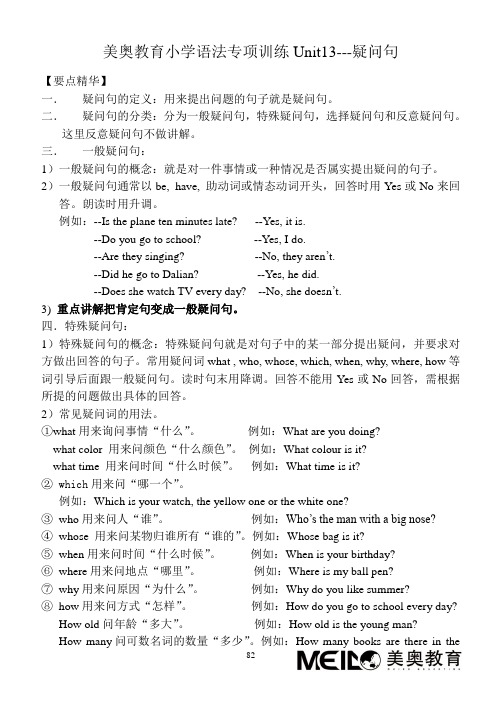
【要点精华】一.疑问句的定义:用来提出问题的句子就是疑问句。
二.疑问句的分类:分为一般疑问句,特殊疑问句,选择疑问句和反意疑问句。
这里反意疑问句不做讲解。
三.一般疑问句:1)一般疑问句的概念:就是对一件事情或一种情况是否属实提出疑问的句子。
2)一般疑问句通常以be, have, 助动词或情态动词开头,回答时用Yes或No来回答。
朗读时用升调。
例如:--Is the plane ten minutes late? --Yes, it is.--Do you go to school? --Yes, I do.--Are they singing? --No, they aren’t.--Did he go to Dalian? --Yes, he did.--Does she watch TV every day? --No, she doesn’t.3) 重点讲解把肯定句变成一般疑问句。
四.特殊疑问句:1)特殊疑问句的概念:特殊疑问句就是对句子中的某一部分提出疑问,并要求对方做出回答的句子。
常用疑问词what , who, whose, which, when, why, where, how等词引导后面跟一般疑问句。
读时句末用降调。
回答不能用Yes或No回答,需根据所提的问题做出具体的回答。
2)常见疑问词的用法。
①what用来询问事情“什么”。
例如:What are you doing?what color 用来问颜色“什么颜色”。
例如:What colour is it?what time 用来问时间“什么时候”。
例如:What time is it?② which用来问“哪一个”。
例如:Which is your watch, the yellow one or the white one?③who用来问人“谁”。
例如:Who’s the man with a big nose?④whose 用来问某物归谁所有“谁的”。
小学英语特殊疑问句汇总
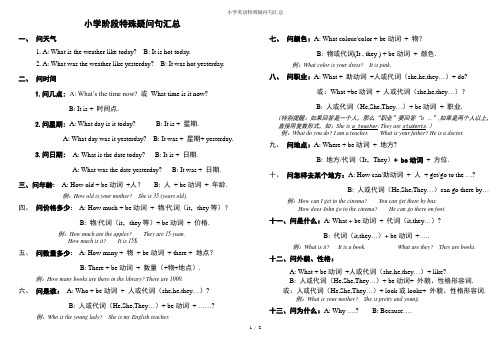
小学阶段特殊疑问句汇总一、问天气1. A: What is the weather like today? B: It is hot today.2. A: What was the weather like yesterday? B: It was hot yesterday.二、问时间1.问几点:A: What’s the time now? 或What time is it now?B: It is + 时间点.2.问星期: A: What day is it today? B: It is + 星期.A: What day was it yesterday? B: It was + 星期+ yesterday.3.问日期:A: What is the date today? B: It is + 日期.A: What was the date yesterday? B: It was + 日期. 三、问年龄: A: How old + be动词+人?B: 人+ be动词+ 年龄.例:How old is your mother? She is 35 (years old).四、问价格多少: A: How much + be动词+ 物/代词(it,they等)?B: 物/代词(it,they等)+ be动词+ 价格.例:How much are the apples? They are 15 yuan.How much is it? It is 15$.五、问数量多少:A: How many + 物+ be动词+ there + 地点?B: There + be动词+ 数量(+物+地点).例:How many books are there in the library? There are 1000.六、问是谁:A: Who + be动词+ 人或代词(she,he,they…)?B: 人或代词(He,She,They…)+ be动词+ ……?例:Who is the young lady? She is my English teacher. 七、问颜色:A: What colour/color + be动词+ 物?B: 物或代词(It , they ) + be动词+ 颜色.例:What color is your dress? It is pink.八、问职业:A: What + 助动词+人或代词(she,he,they…)+ do?或:What +be动词+ 人或代词(she,he,they…)?B: 人或代词(He,She,They…)+ be动词+ 职业.(特别提醒:如果回答是一个人,那么“职业”要回答“a …”,如果是两个人以上,直接用复数形式,如:She is a teacher. They are students.)例:What do you do? I am a teacher. What is your father? He is a doctor.九、问地点:A: Where + be动词+ 地方?B: 地方/代词(It,They)+ be动词+ 方位.十、问怎样去某个地方:A: How can/助动词+ 人+ get/go to the …?B: 人或代词(He,She,They…)can go there by…例:How can I get to the cinema? You can get there by bus.How does John go to the cinema? He can go there on foot.十一、问是什么:A: What + be动词+ 代词(it,they…)?B: 代词(it,they…)+ be动词+ ….例:What is it? It is a book. What are they? They are books.十二、问外貌、性格:A: What + be动词+人或代词(she,he,they…)+ like?B: 人或代词(He,She,They…)+ be动词+ 外貌、性格形容词.或:人或代词(He,She,They…)+ look或looks+ 外貌、性格形容词.例:What is your mother? She is pretty and young.十三、问为什么:A: Why ….? B: Because….例:Why are you so happy? Because I don’t go to school.Why do you like summer? Because I can swim in the river.Why do you like apples? Because they are sweet and healthy.(特别提醒:最后接的名词是可数的要用复数形式,答句用“they are”)十四、问感觉:A: How +助动词+人+feel?或:How+ be动词+人或代词(she,he,they…)’s+ feeling?B: 人或代词(He,She,They…)+be动词+感觉形容词.或:人+ feel/feels/felt+感觉形容词.例:How do you feel? 或How is your feeling? I am happy. 或I feel happy.How did Mike feel yesterday? He was sad, because he failed the math test.十五、问“怎么了?”A: What’s the matter with +人或代词(用宾格:her,him,them,me)?B: 人或代词(He,She,They…)+be动词+症状.例:What’s the matter with you? I have a headache.What’s the matter with her? She has a fever.What was the matter with Mike yesterday? He had a toothache.十六、问“吃什么”或“上什么课”A: What +助动词+人+have +时间? B: 人+have/has+…(+时间).例:What do you have on Mondays? I have Chinese, math and English.What does Mike have for lunch? He has rice and potatoes for lunch.What did you have for dinner? I had beef and bread.十七、问选择或最喜欢问选择:Which one +助动词+人+like, A or B?问最喜欢:A: What is your/his/her/our/…’s favourite +东西(food,fruit,season…)?或:Which +东西(food,fruit,season…)+助动词+人+like best?B: My/His/Her/Our/…’s favourite +东西+ be动词+…或:人或代词(He,She,They…)like/likes +….+best. 十八、四种时态1、正在进行时:A: What+ be动词+人或代词(she,he,they…)+doing?B: 人或代词(She,He,They…)+ be动词+doing.例:What are you doing now? I am reading.What is your mother doing now? She is cooking dinner.What were you doing at 7:00 last night? I was watching TV.2、一般现在时:A: What + do /does +人或代词(she,he,they…)+often/usually +do?B: 人或代词(He,She,They…)+often/usually +…例:What do you do on weekends? I visit my grandparents.What does Mike do on Sundays? He often goes hiking.3、一般将来时A: 疑问代词+ be动词+人或代词(she,he,they…)+going (to +do)(+时间)?或:疑问代词will +人或代词(she,he,they…)+do..(动词原形) (+时间)?B: 人或代词(He,She,They…)+ be动词+going to ….或:人或代词(He,She,They…)+will+do…(动词原形).例:What are you going to do tonight? I am going to read a book.Where will they go? They will fly to BeiJing.Where is Mike going tomorrow morning? He is going to the park.4、一般过去时A: 疑问代词+ did+人或代词(she,he,they…)+do(动词原形)(+时间)?B: 人或代词(He,She,They…)+ 动词过去式.例:What did Mike do last night? He read a book at home.Where did you go last night? I went to the hospital.。
小学英语必须掌握的8个特殊疑问句(附例句)

小学英语必须掌握的8个特殊疑问句(附例句)1、由who/whom/whose 引导的注释:who的意思是“谁”,询问人(做主语);whom的意思是“谁”,询问人(作宾语);whose的意思是“谁的”,询问物体的所属。
◆Who are you? 你是谁?I am Cara. 我是卡拉。
◆Whose book is this? 这本书是谁的?It’s mine. 它是我的。
2、由which 引导的注释:which即“哪一,哪一个”,问一定范围内特指的人或物。
◆Which box is yours? 哪个盒子是你的?The blue one. 蓝色的那个。
◆Which book do you like best? 你最喜欢哪本书?The Little Prince.《小王子》。
◆Which country do you come from? 你来自哪个国家?China. 中国。
3、由when 引导的注:when即“什么时候/何时”,询问时间。
◆When shall we meet? 我们什么时候见面?Tomorrow 明天。
◆When is her birthday? 她什么时候生日?May 1 is her birthday. 五月一号是她的生日。
◆When do you get up every day? 你每天什么时候起床?At 6:00 a.m. 早上六点。
4、由where 引导的注:where即“哪里,在哪里”,询问地点。
◆Where will you spend the summer holiday? 你会去哪里过暑假?I'm going to Hawaii. 我要去夏威夷。
◆Where is your coat? 你的外套在哪啊?It’s on the sofa. 在沙发上。
5、由why 引导的注:why即“为什么”,询问原因,回答从句一般由because引导。
◆Why isn’t he at school today? 他今天为什么不在学校?Because he is ill. 因为他生病了。
50个特殊疑问句加回答 [小学英语口语疑问句型锦集]
![50个特殊疑问句加回答 [小学英语口语疑问句型锦集]](https://img.taocdn.com/s3/m/21e69e79dd88d0d233d46afe.png)
50个特殊疑问句加回答[小学英语口语疑问句型锦集]英语口语网权威发布小学英语口语疑问句型锦集,更多小学英语口语疑问句型锦集相关信息请访问英语口语网。
【导语】小学英语教学中,教师囿于应试教育模式,教学方法单一、学生机械记忆词汇、语法,抑制了学生的学习热情,加重了学生的课业负担,也导致了"哑巴英语"现象的发生。
下面是大范文网整理的小学英语口语疑问句型,希望对你们有帮助。
1、询问姓名、年龄:name,Howold1.—What"syourname?你叫什么名字?—Mynameis_____.我叫……。
2.—What"shis/her/name?他/她的名字是什么?—His/Hernameis____.他/她的名字是....3.—Howoldareyou?你几岁了?—I"m12.我十二岁。
4.—Howoldishe/she?他/她几岁了?—He/Sheis23.他/她23岁。
2、询问颜色:colour1.—Whatcolourisit?它是什么颜色的?—It"syellowandwhite.黄白相间。
2.—Whatcolourarethey?它们是什么颜色的?—They"regreen.绿色的。
3、询问时间或日期:When1.—Whattimeisitnow?现在几点钟?—It"snineo"clock.It"stimeforEnglishclass.九点。
该上英语课了。
2.—Whatdayisittoday?今天星期几?—It"sMonday.星期一。
—WhatdowehaveonMondays?我们星期一上哪些课?—WehaveChinese,English,math…语文、英语、数学……3.—Whenisyourbirthday?你的生日是什么时候?—It"sOctober1st,ourNationalDay.十月一日。
小学英语疑问句型汇总大全
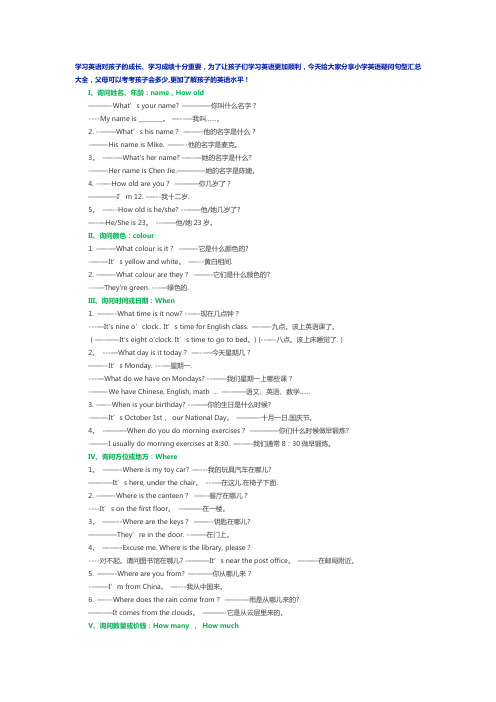
学习英语对孩子的成长、学习成绩十分重要,为了让孩子们学习英语更加顺利,今天给大家分享小学英语疑问句型汇总大全,父母可以考考孩子会多少,更加了解孩子的英语水平!I、询问姓名、年龄:name,How old———-What’s your name? ————你叫什么名字?----My name is ________。
—--—我叫……。
2. --——What’s his name?—-—-他的名字是什么?-——-His name is Mike. ——--他的名字是麦克。
3。
-—-—What's her name? -—-—她的名字是什么?-——-Her name is Chen Jie.————她的名字是陈婕。
4. --—-How old are you?-———你几岁了?————I’m 12. -—--我十二岁.5。
-—--How old is he/she? --——他/她几岁了?—-—He/She is 23。
--——他/她23岁。
II、询问颜色:colour1. -—-—What colour is it?-——-它是什么颜色的?-—-—It’s yellow and white。
—---黄白相间.2. -——-What colour are they?-——-它们是什么颜色的?---—They're green. ---—绿色的.III、询问时间或日期:When1. ——--What time is it now? --—-现在几点钟?---—It's nine o’clock.. It’s time for English class. —-—-九点。
该上英语课了。
(—-——It's eight o'clock. It’s time to go to bed。
) (--—-八点。
该上床睡觉了.)2。
---—What day is it today?—--—今天星期几?——--It’s Monday. ---—星期一.---—What do we have on Mondays? --——我们星期一上哪些课?-——-We have Chinese, English, math …—-——语文、英语、数学……3. -—--When is your birthday? --——你的生日是什么时候?-—-—It’s October 1st,our National Day。
小学英语100例:疑问句强化练习及答案
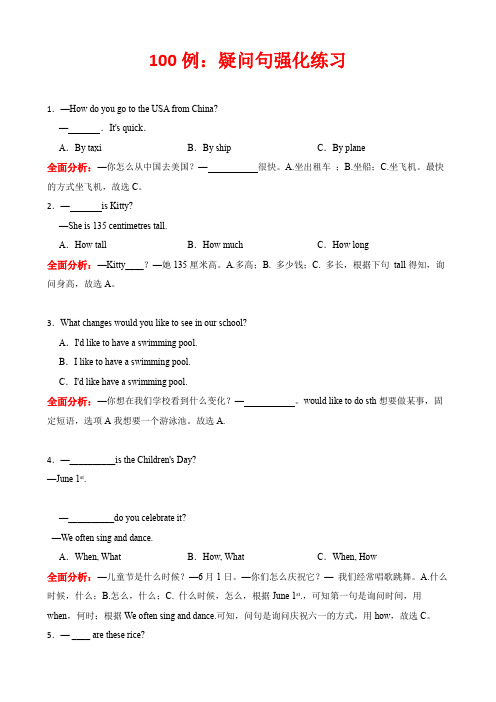
100例:疑问句强化练习1.—How do you go to the USA from China?— .It's quick.A.By taxi B.By ship C.By plane全面分析:—你怎么从中国去美国?— 很快。
A.坐出租车;B.坐船;C.坐飞机。
最快的方式坐飞机,故选C。
2.— is Kitty?—She is 135 centimetres tall.A.How tall B.How much C.How long全面分析:—Kitty____—她135厘米高。
A.多高;B. 多少钱;C. 多长,根据下句tall得知,询问身高,故选A。
3.What changes would you like to see in our school?A.I'd like to have a swimming pool.B.I like to have a swimming pool.C.I'd like have a swimming pool.全面分析:—你想在我们学校看到什么变化?— 。
would like to do sth想要做某事,固定短语,选项A我想要一个游泳池。
故选A.4.—__________is the Children's Day?—June 1st.—__________do you celebrate it?—We often sing and dance.A.When, What B.How, What C.When, How全面分析:—儿童节是什么时候?—6月1日。
—你们怎么庆祝它?— 我们经常唱歌跳舞。
A.什么时候,什么;B.怎么,什么;C. 什么时候,怎么,根据June 1st.,可知第一句是询问时间,用when,何时;根据We often sing and dance.可知,问句是询问庆祝六一的方式,用how,故选C。
5.— ____ are these rice?— Ten yuan.A.How many B.How much C.What全面分析:——这些米是?——十元。
小学英语重点疑问句归纳
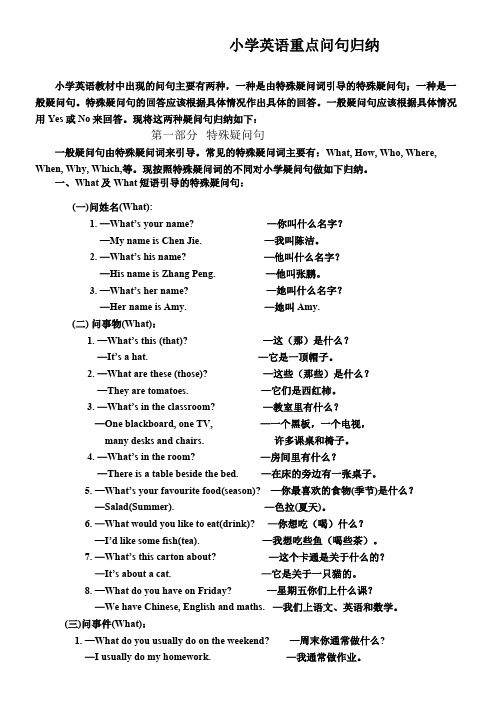
小学英语重点问句归纳小学英语教材中出现的问句主要有两种,一种是由特殊疑问词引导的特殊疑问句;一种是一般疑问句。
特殊疑问句的回答应该根据具体情况作出具体的回答。
一般疑问句应该根据具体情况用Yes或No来回答。
现将这两种疑问句归纳如下:第一部分特殊疑问句一般疑问句由特殊疑问词来引导。
常见的特殊疑问词主要有:What, How, Who, Where,When, Why, Which,等。
现按照特殊疑问词的不同对小学疑问句做如下归纳。
一、What及What短语引导的特殊疑问句:(一)问姓名(What):1. —What’s your name? —你叫什么名字?—My name is Chen Jie. —我叫陈洁。
2. —What’s his name? —他叫什么名字?—His name is Zhang Peng. —他叫张鹏。
3. —What’s her name? —她叫什么名字?—Her name is Amy. —她叫Amy.(二) 问事物(What):1. —What’s this (that)? —这(那)是什么?—It’s a hat. —它是一顶帽子。
2. —What are these (those)? —这些(那些)是什么?—They are tomatoes. —它们是西红柿。
3. —What’s in the classroom? —教室里有什么?—One blackboard, one TV, —一个黑板,一个电视,many desks and chairs. 许多课桌和椅子。
4. —What’s in the room? —房间里有什么?—There is a table beside the bed. —在床的旁边有一张桌子。
5. —What’s your favourite food(season)? —你最喜欢的食物(季节)是什么?—Salad(Summer). —色拉(夏天)。
小学英语必须掌握的八个特殊疑问句(附例句)
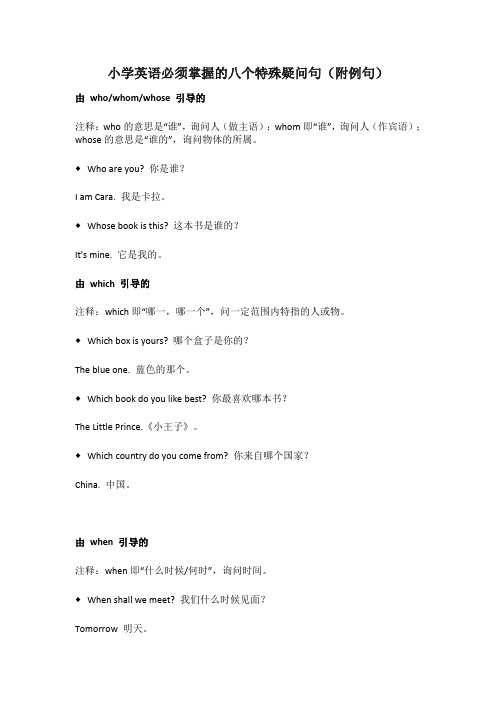
小学英语必须掌握的八个特殊疑问句(附例句)由who/whom/whose 引导的注释:who的意思是“谁”,询问人(做主语);whom即“谁”,询问人(作宾语);whose的意思是“谁的”,询问物体的所属。
◆ Who are you? 你是谁?I am Cara. 我是卡拉。
◆ Whose book is this? 这本书是谁的?It's mine. 它是我的。
由which 引导的注释:which即“哪一,哪一个”,问一定范围内特指的人或物。
◆ Which box is yours? 哪个盒子是你的?The blue one. 蓝色的那个。
◆ Which book do you like best? 你最喜欢哪本书?The Little Prince.《小王子》。
◆ Which country do you come from? 你来自哪个国家?China. 中国。
由when 引导的注释:when即“什么时候/何时”,询问时间。
◆ When shall we meet? 我们什么时候见面?Tomorrow 明天。
◆ When is her birthday? 她什么时候生日?May 1st is her birthday. 五月一号是她的生日。
◆ When do you get up every day? 你每天什么时候起床?At 6:00 a.m. 早上六点。
由where 引导的注释:where即“哪里,在哪里”,询问地点。
◆ Where will you spend the summer holiday? 你会去哪里过暑假?I m going to Hawaii. 我要去夏威夷。
◆ Where is your coat? 你的外套在哪啊?It's on the sofa. 在沙发上。
由why 引导的注释:why即“为什么”,询问原因,回答从句一般由because引导。
◆ Why isn't he at school today? 他今天为什么不在学校?Because he is ill. 因为他生病了。
- 1、下载文档前请自行甄别文档内容的完整性,平台不提供额外的编辑、内容补充、找答案等附加服务。
- 2、"仅部分预览"的文档,不可在线预览部分如存在完整性等问题,可反馈申请退款(可完整预览的文档不适用该条件!)。
- 3、如文档侵犯您的权益,请联系客服反馈,我们会尽快为您处理(人工客服工作时间:9:00-18:30)。
英语学科 | 小学英语疑问句型大全1. ----What’s your name? ----你叫什么名字?----My name is ________. ----我叫……。
2. ----What’s his name? ----他的名字是什么?----His name is Mike. ----他的名字是麦克。
3. ----What’s her name? ----她的名字是什么? ----Her name is Chen Jie.----她的名字是陈婕。
4. ----How old are you? ----你几岁了?----I’m 12. ----我十二岁。
5. ----How old is he/she? ----他/她几岁了?----He/She is 23. ----他/她23岁。
1. ----What colour is it? ----它是什么颜色的? ----It’s yellow and white. ----黄白相间。
2. ----What colour are they? ----它们是什么颜色的?----They’re green. ----绿色的。
1. ----What time is it now? ----现在几点钟?----It’s nine o’clock.. It’s time for English class. ----九点。
该上英语课了。
(----It’s eight o’clock. It’s time to go to bed.) (----八点。
该上床睡觉了。
)2. ----What day is it today? ----今天星期几?----It’s Monday. ----星期一。
----What do we have on Mondays? ----我们星期一上哪些课?----We have Chinese, English, math … ----语文、英语、数学……3. ----When is your birthday? ----你的生日是什么时候?----It’s October 1st, our National Day. ----十月一日.国庆节。
4. ----When do you do morning exercises? ----你们什么时候做早锻炼? ----I usually do morning exercises at 8:30. ----我们通常8:30做早锻炼。
1. ----Where is my toy car? ----我的玩具汽车在哪儿?----It’s here, under the chair. ----在这儿.在椅子下面。
2. ----Where is the canteen? ----餐厅在哪儿?----It’s on the first floor. ----在一楼。
3. ----Where are the keys? ----钥匙在哪儿?----They’re in the door. ----在门上。
4. ----Excuse me. Where is the library, please? ----对不起.请问图书馆在哪儿?----It’s near the post office. ----在邮局附近。
5. ----Where are you from? ----你从哪儿来?----I’m from China. ----我从中国来。
6. ----Where does the rain come from? ----雨是从哪儿来的?----It comes from the clouds. ----它是从云层里来的。
1. ----How many kites can you see? ----你可以看见几只风筝?----I can see 12. ----我可以看见十二只风筝。
2. ----How many crayons do you have? ----你有多少支彩笔?----I have 16. ----我有十六支。
3. ----How many people are there in your family? ----你家有几口人? ----Three. ----三人。
4. ----How much is this dress? ----这条连衣裙多少钱?----It’s ninety-nine yuan. ----九十九元。
5. ----How much are these apples? ----这些苹果多少钱?----They’re thirty-five yuan. ----三十五元。
1. ----How tall are you? ----你有多高?----I’m 160 cm tall. I’m taller than you. ----我有160公分。
我比你高。
2. ----How heavy are you? ----你有多重?----I’m 48 kg. You’re heavier than me. ----我有48公斤。
你比我重。
3. ----How do you go to school? ----你怎么上学?----Usually I go to school on foot. Sometimes I go by bike. ---我通常步行上学。
有时候骑自行车。
4. ----How can I get to Zhongshan Park? ----我怎么到中山公园去?----You can go by the No. 15 bus. ----你可以乘坐15路公汽。
(----Go straight for five minutes. Then turn left. It’s on the left.)----直走五分钟。
然后左转。
公园就在左边。
、5. How long 有多长?1. ----How do you feel? ----你感觉如何?----I feel sick. ----我觉得不舒服。
----How does Chen Jie feel? ----陈洁感觉如何?----She’s tired. ----她很疲倦。
2. ----What’s the matter? ----怎么了?----My throat is sore. / I have a sore throat. ----我的喉咙疼。
3. ----How are you, Sarah? You look so happy. ----你好吗.莎拉?你看起来这么伤心。
----I failed the math test. ----我的数学考试没有通过。
1. ----What would you like for breakfast / lunch / dinner ? ----你早餐/中餐/晚餐想吃点什么?----I’d like some bread and milk / rice and soup. ---我想吃面包和牛奶/米饭和汤。
2. ----What’s for breakfast / lunch / dinner? ----早餐/中餐/晚餐吃什么?----Hamburgers and orange juice. ----汉堡包和橙汁。
1. ----What’s the weather like in Beijing? ----北京的天气如何?----It’s rainy today. How about New York? ----今天是雨天。
纽约呢? ----It’s sunny and hot. ----今天是晴天.天气很热。
1. ----What’s your father / mother? ----你的父亲 / 母亲是做什么的? ----He’s a doctor. / She’s a teacher. ----他是一名医生。
/ 她是一名教师。
2. ----What does you mother / father do? ----你的母亲 / 父亲是做什么的?----She’s a TV reporter. / He’s a teacher. He teaches En glish. ----她是一名电视台记者。
/他是一名教师。
他教英语。
3. ----Who’s that man / woman? ---那位男士 / 女士是谁?----He’s my father. / She’s my mother. ----他是我父亲。
/ 她是我母亲。
4. ----Who’s this boy / girl? ----那个男孩儿 / 女孩儿是谁?----He’s my brother. / She’s my sister. ----他是我兄弟。
/ 她是我姐妹。
5. ----Who’s your art teacher? ----你们的美术老师是谁?----Miss Wang. ----王老师。
----What’s she like? ----她长什么样儿?----She’s young and thin. ----她很年轻、苗条。
1. ----What’s your favourite food / drink? ----你最喜欢的食物 / 饮料是什么?----Fish / orange juice. ----鱼。
/ 橙汁。
2. ----What’s your favourite season? ----你最喜欢的季节是什么?----Winter. ----冬天。
(----Which season do you like best? (----你最喜欢哪个季节?----Winter.) ----冬天。
)----Why do you like winter? ----你为什么喜欢冬天?----Because I can make a snowman. ----因为可以堆雪人。
3. ----What’s your hobby? ----你的爱好是什么?----I like collecting stamps. ----我喜欢集邮。
----What’s his hobby? ----他的爱好是什么?----He likes riding a bike. ----他喜欢骑自行车。
4. ----Do you like peaches? ----你喜欢吃桃子吗?----Yes, I do. / No, I don’t. ----喜欢。
/ 不喜欢。
1. ----What do you do on Saturdays / on the weekends? ----你星期六 / 周末一般做什么?----I usually do my homework. Sometimes I play football.----我通常做作业.有时候踢足球。
